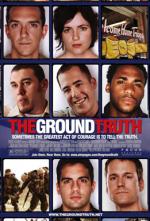As this family shares the horrific details of their son's last days in hope that we can begin to recognize the extent of what our young troops endure in the name of Iraq invasion/occupation, we can also recognize what we have consigned our military to suffer for the sake of a Commander-in-Chief who has all but abandoned the integrity, duty, honor and respect for the very troops he commands. Conduct unbecoming a Commander-in-Chief ought to be held to same standards required of our troops in upholding their sworn oath to the Constitution.
Recounting a fallen Marine's last days
Tuesday, September 5, 2006
By JOHN FENTON
In the four months since the death of my son, Sgt. Matthew J. Fenton, from injuries suffered in Iraq, I have stated many times the horror of what I saw in the National Naval Medical Center, Bethesda, Md.
I believe that the time has arrived to tell the whole story of his death and the carnage that was inflicted on some of his fellow Marines. I do not find this easy to do, but as the death toll and injured number continues to climb, I cannot sit silently.
On April 26, Matthew, 24, was the gunner on a Humvee protecting a Marine convoy on the outskirts of Fallujah. A suicide car bomber attempted to ram his Humvee, and he got off a few shots at the vehicle. From what I have been told it is common practice for these bombers to detonate their bomb if they come under fire. Matthew was the only Marine injured in the attack. Later that same day I received a phone call telling me that Matt was seriously wounded and that it was a head injury.
The next day we were informed that Matt had been flown to Germany. Matt’s mother, Diane, and I prepared to go to Germany. But in the middle of trying to get a flight, we received another call saying that he had stabilized and they were going to fly him to the United States. We were all lifted by this seemingly good news.
Diane and I flew to Washington the next day and were met by a uniformed Marine and driven to Bethesda. What awaited us there is still shocking to me now. We met with two doctors who laid everything out for us. Matthew’s injury was a devastating one. Shrapnel had entered his head just above his left eye and traveled diagonally through his brain and exited the right rear.
‘A nightmare’
Surgeons in Baghdad had removed two plates from his skull to help relieve the pressure from the swelling of his brain. The frontal lobe was destroyed, so they had removed it. It was explained that the frontal lobe is the center of personality and the place where someone is aware of themselves. The Matthew that we knew and loved was gone and would never come back.
As we struggled with that staggering news there was more to come. The shrapnel had done severe damage to both sides of Matt’s brain because of the angle that it traveled through. The brain can figure a way to control functions when one side is damaged, like in a stroke. But this was devastating news. The doctors told us that if this had happened in Vietnam, there would have been no surgery. If this happened in front of the best hospital in New York City, there would have been no surgery. His chances of ever having meaningful movement were less than slim.
Why, we asked was the surgery done in Baghdad? The answer, surgeons do whatever they can to keep a soldier alive. They do not decide life or death.
We were then led down a long hospital corridor toward my son’s room. This is the moment that I will never forget until the day I die. Just outside his room we were instructed that we had to don gowns, masks and gloves every time we entered the room. This was to prevent us from picking up bacteria that Matt may have brought back from Iraq and spreading it to other patients in the ward.
My shock was doubled upon seeing Matthew. He was unrecognizable. His head was completely swollen, like some cartoon character. There were maybe hundreds of metal staples in his head. There were of course tubes coming and going everywhere. There were drains running from the site of the surgery. And there was the ventilator. I immediately snapped at the doctors. Somewhere along the line I had been informed that Matt was breathing on his own. Nine years ago I watched my father die after having lung cancer surgery. He never got off of the ventilator, and I flashed back to that time.
Matthew was able to breathe on his own, the doctors explained. The ventilator was only assisting. His heart and lungs were perfect. There had been no damage to his brain stem, which controls involuntary actions like breathing and the heart beating. So there we were looking at our son, not recognizing him, not a scratch on him below his eyes. But his face and head mangled and inflated. This must be a nightmare, one that we will never wake up from.
What war leaves behind
For days we made that walk down that long hallway. It took some time but I finally was able to look at some of the other Marines on the ward with Matthew. I wish to this moment that I hadn’t. Kids with horrible injuries.
One had been in the ward for 11 months, after seven different brain surgeries. His wife refused to let him go. She was praying for a miracle. He had parts of his skull removed also, but all the swelling was gone now and his head had sunken in where they had been removed. He did not move at all.
Across the ward another Marine was in his third month, and his head was all sunken in. This is what lay ahead for Matthew also. Also across the ward was another Marine who was there only a few days before Matt. He was lucky, damage to only one side of his brain. I became friendly with his father, Jim, from Tennessee. One day there was an uproar from his son’s room and I looked over and made eye contact with Jim. Maybe an hour later we met in the hallway and he apologized to me. His son had opened his eyes for the first time and his family just responded. There was no need for an apology as I would have jumped for joy if Matthew were to open his eyes.
All that was left was to decide when the life support would be removed. That final decision rested in the hands of his mother. There was no disagreement on what course to follow, just when.
On May 3, the Marine Corps commandant presented Matthew with his Purple Heart. On May 4, I noticed that the swelling of Matthew’s head was going down. By the end of the day the indentations where pieces of his skull were missing were becoming noticeable. The next morning I was dreading what he might be looking like. And, yes, there was his head becoming very odd shaped.
Letting go
I prayed that Diane would find the strength to let her son go today. I did not want to see him decline another day. Another day of watching his head sink into his skull. And neither did she.
Sometime around noon on May 5, Matthew was moved from the ward to a private room. Behind some curtains they removed the ventilator and most of the tubes. He was kept on the morphine, and we were assured he would not feel any pain. Now he was breathing all on his own. Diane got into the hospital bed with her son, and I held his hand and we all waited and watched for Matthew to pass.
But he would not go easily. After three hours of labored breathing, I asked the nurse if there was anything that she could do. No. I asked God to take him now. No. His mother told him to go. I asked him to go. Go to some peace. A half-hour later, he finally took his last breath.
This is the real story of the war in Iraq. We all know the numbers, and we all know the reasons that are claimed that we have to be there. But this is the reality: young, brave, patriotic men losing their lives for a cause that keeps shifting.
Every politician who supports the war should go to Bethesda or Walter Reed and see just what their support is costing in human life and suffering. And to everyone who opposes the war, don’t just sit back any longer. Someday you may be touched personally by some tragedy from this disastrous war, and it will be too late, like it is for me.
John Fenton lives in Little Ferry.
(my comment; John is a member of Military Families Speak Out; this account demonstrates why it is so relevant when military families exercise the courage to speak out . There is no point in continuing the invasion and occupation in Iraq one more day - Bring Them Home Now! )





